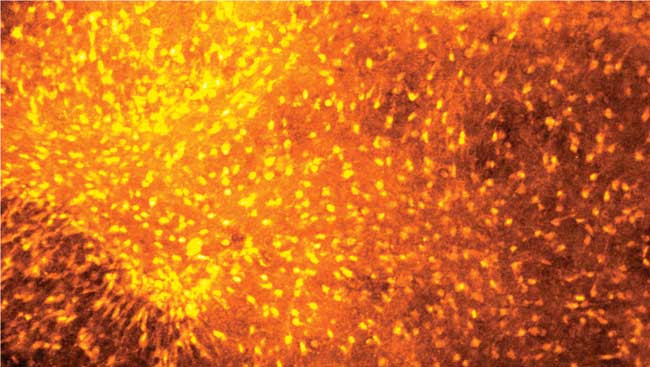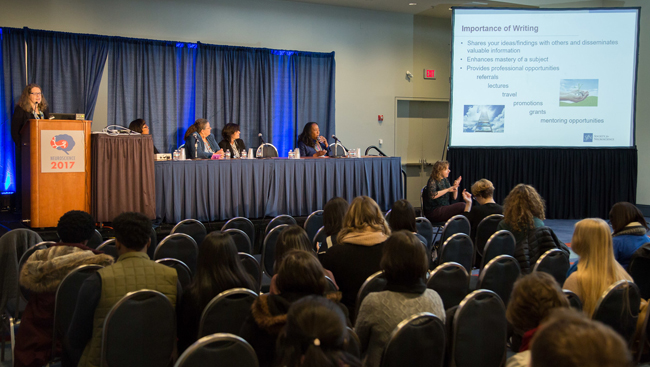Funding Opportunities to Build Interdisciplinary Neuroscience Research for the Future
- Featured in:
- SfN Annual Meeting Recordings
Apr 05, 2018
As the field of neuroscience evolves, NSF is focusing its training and research support towards team-based interdisciplinary strategies to understand how healthy brains and neural circuits function.
This Neuroscience 2017 event is designed to inform educational and research leaders at all career stages about national and international funding opportunities that emphasize interdisciplinary neuroscience training and research.
Speakers

Edda (Floh) Thiels, PhD
Edda (Floh) Thiels is an adjunct associate professor of neurobiology at the University of Pittsburgh School of Medicine and a program director in the Directorate for Biological Sciences at the National Science Foundation. Thiels’ main research interests lie in how animals acquire information from the environment and use that information to guide their behavior. She received her undergraduate degree in psychology from the University of Toronto and her PhD in psychology from Indiana University.

James Deshler, PhD
James Deshler is the deputy director for the Division of Biological Infrastructure in the Biological Sciences Directorate at the National Science Foundation where he oversees training and infrastructure programs aimed to promote fundamental research across the biological sciences. He also co-chairs the “Understanding the Brain” coordinating group which oversees neuroscience programs across NSF. He received his undergraduate and PhD degrees in molecular genetics and molecular biology at University of California, Los Angeles and completed his postdoctoral training at Harvard Medical School.

Betty Tuller, PhD
Betty Tuller is director of the program in perception, action, and cognition at the U.S. National Science Foundation. Her major research interests lie in using the concepts and tools of complexity and pattern formation in nonlinear systems to understand motor, perceptual, and cognitive processes, with a particular emphasis on the perception and production of speech. Before coming to the National Science Foundation in 2007, she co-founded and co-directed an interdisciplinary center for complex systems and brain sciences at Florida Atlantic University, where she also served as professor of complex systems and brain sciences, professor of psychology, and professor of biomedical sciences. She is the recipient of several honors, including the Professorial Excellence Award from the State of Florida and the National Science Foundation's Director's Award for Excellence, and is an elected fellow of the American Association for the Advancement of Science and the Association for Psychological Science.
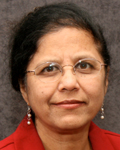
Shubhra Gangopadhyay, PhD
Shubhra Gangopadhyay is the LaPierre Endowed Chair Professor in the department of electrical engineering and computer science at the University of Missouri and a program director at the National Science Foundation (NSF). She previously was a professor at Texas Tech University. Gangopadhyay's main research interests lie in nanotechnology, nanoelectronics and biotechnology. She received her undergraduate degree in physics from Jabalpur University and her PhD in physics from Indian Institute of Technology, Kharagpur. She completed her postdoctoral training at Universitat Kaiserslautern.

Junping Wang, PhD
Junping Wang is a program director in the division of mathematical sciences at the National Science Foundation (NSF). He is actively involved in various foundation-wide and cross agency activities of interdisciplinary nature. Wang earned his PhD in mathematics from the University of Chicago and completed his postdoctoral training at Cornell University.

Kenneth Whang, PhD
Ken Whang is a program officer in the division of information and intelligent systems at the National Science Foundation (NSF), where he manages programs in computational neuroscience and other areas at the interface of neuroscience and computing. He previously held research and policy positions at the University of Minnesota, the U.S. Senate, and the Office of Science and Technology Policy. He earned his BA in biophysics from Columbia University, PhD in neuroscience from Washington University, and completed his postdoctoral training at the University of Minnesota.

William Miller, PhD
William (Bill) Miller is the science advisor for the Office of Advanced Cyberinfrastructure (OAC) in the Computer Information Science and Engineering (CISE) Directorate at the National Science Foundation (NSF). In addition to his cyberinfrastructure efforts, he has been deeply involved in NSF and interagency neuroscience activities, in planning and oversight of NSF’s large-scale scientific facilities, and in international coordination on open science and other topics. Miller earned his BS in aerospace engineering from the University of Michigan and his PhD in Neuroscience from the University of California – Davis.

Sridhar Raghavachari, PhD
Sridhar Raghavachari is program director at the National Science Foundation (NSF). Raghavachari’s main research interests lie in mathematical models of synapse structure, function and plasticity. He received his undergraduate degree in physics from Birla Institute of Technology and Science, India and his PhD in physics from University of Notre Dame. He completed his postdoctoral training at Brandeis University.

Stephanie Albin, PhD
Stephanie Albin is a science program officer at The Kavli Foundation. Prior to joining the Foundation, Albin was an American Association for the Advancement of Science (AAAS) Science and Technology Policy Fellow stationed at the National Science Foundation (NSF) in the Division of Chemistry. Albin earned her BS in biology from Massachusetts Institute of Technology and her PhD in neuroscience at the University of California, San Francisco. She completed her postdoctoral training at the Howard Hughes Medical Institute (HHMI)’s Janelia Research Campus.

Helen Fawcett, PhD
Helen Fawcett is the program coordinator for the Understanding the Brain (UtB): Neurophotonics NSF Research Traineeship Program at Boston University. She is an assistant research faculty member in the mechanical engineering department at Boston University (BU) and the manager of operations and technical programs at the Photonics Center. Prior to her work at BU, Fawcett’s experience has been in industry working at various startup companies that manufacture precision rotary and linear encoders for industrial environments and at telecommunications startups making optical channel monitors and later private label packaging.
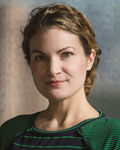
Amina Ann Qutub, PhD
Amina Qutub is an assistant professor of bioengineering at Rice University. Her research interests are in cellular systems biology. Her lab’s research vision is to interpret human cells’ communication during tissue growth in order to understand and improve health. The Qutub Lab develops tightly coupled experimental-computational methods to identify mechanisms of how neural stem cells form functional neuronal networks. Qutub earned her BS in chemical engineering from Rice Univeristy and her PhD in bioengineering from the University of California, Berkeley. She completed her postdoctoral training in biomedical engineering at Johns Hopkins University School of Medicine.

Roger Quinn, PhD
Roger D. Quinn is an Arthur P. Armington Professor of Engineering at Case Western Reserve University. He earned his PhD in engineering science and mechanics from Virginia Polytechnic Institute and State University. He has directed CWRU Biologically Inspired Robotics since its inception in 1990.
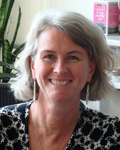
Diane Lipscombe, PhD
Diane Lipscombe is a professor in the neuroscience department at Brown University and is the interim director of the Brown Institute for Brain Science. She teaches advanced cellular and molecular neuroscience and chairs the Neuroscience Graduate Program Steering Committee. Her research focus is on a family of proteins that control the flow of calcium into neurons. Lipscombe has authored numerous publications and has given named lectures, including the Joan Mott Prize Lecture for the Physiological Society in the United Kingdom. She is a regular member of NIH scientific review panels, serves on several editorial boards, and is an elected fellow of the American Association for the Advancement Science.
More in Professional Development
3 of 5 articles left
Login
or
Become a Member
to unlock content


